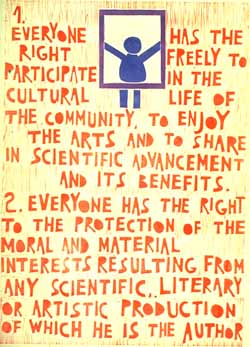Rights to enjoy and benefit from culture
Back to rights and freedoms: right by right
ICESCR Article 15 | Cultural rights and indigenous people | Cultural rights and people with disability | International scrutiny | More information | Comments
ICESCR Article 15
ICESCR Article 15 states:
- The States Parties to the present Covenant recognize the right of everyone:
(a) To take part in cultural life;
(b) To enjoy the benefits of scientific progress and its applications;
(c) To benefit from the protection of the moral and material interests resulting from any scientific, literary or artistic production of which he is the author. - The steps to be taken by the States Parties to the present Covenant to achieve the full realization of this right shall include those necessary for the conservation, the development and the diffusion of science and culture.
- The States Parties to the present Covenant undertake to respect the freedom indispensable for scientific research and creative activity.
- The States Parties to the present Covenant recognize the benefits to be derived from the encouragement and development of international contacts and co-operation in the scientific and cultural fields.
The Committee on Economic, Social and Cultural Rights has pointed out by reference to this Article that the disctinction between ICESCR and ICCPR rights is not as sharp as may often be supposed.
In particular:
- reference in paragraph 1(a) to the right to take part in cultural life, while requiring positive measures in some cases, overlaps substantially with rights to frreedom of religion, freedom of information and expression, freedom of association and freedom of assembly as well as with the rights of minorities under the ICCPR;
- reference in paragraph 1(c) to rights to benefit from a person's own scientific, literary or artistic production clearly involves rights capable of being made the subject of enforceable legal rights
- reference in paragraph 3 to the freedom indispensable for scientific research clearly encompasses freedom of information, opinion, and expression as well as freedom of association
Cultural rights and Indigenous people
Cultural rights for Aboriginal and Torres Strait Islander peoples have particular recognition through ICCPR Article 1 on self determination and Article 27 on rights of minorities. More detail in this respect is provided in the Declaration on the Rights of Indigenous Peoples and in the Social Justice section of this site.
Cultural rights and people with disability
The Committee on Economic Social and Cultural Rights General Comment on rights of people with disability was issued in 1994. This was well before development of the CRPD and accordingly the Committee referred for guidance to the UN Standard Rules on the Equalisation of Opportunities for Person with Disabilities. The Committee stated:
- The Standard Rules provide that "States should ensure that persons with disabilities have the opportunity to utilize their creative, artistic and intellectual potential, not only for their own benefit, but also for the enrichment of their community, be they in urban or rural areas. ... States should promote the accessibility to and availability of places for cultural performances and services ... ". The same applies to places for recreation, sports and tourism.
- The right to full participation in cultural and recreational life for persons with disabilities further requires that communication barriers be eliminated to the greatest extent possible. Useful measures in this regard might include "the use of talking books, papers written in simple language and with clear format and colours for persons with mental disability, [and] adapted television and theatre for deaf persons".
- In order to facilitate the equal participation in cultural life of persons with disabilities, Governments should inform and educate the general public about disability. In particular, measures must be taken to dispel prejudices or superstitious beliefs against persons with disabilities, for example those that view epilepsy as a form of spirit possession or a child with disabilities as a form of punishment visited upon the family. Similarly, the general public should be educated to accept that persons with disabilities have as much right as any other person to make use of restaurants, hotels, recreation centres and cultural venues
International scrutiny
Special Rapporteur in the field of cultural rights
The Special Rapporteur appointed by the Human Rights Council conducts a wide range of work including
- Right to freedom of artistic expression and creation (2013)
- Right to benefit from scientific progress and its applications (2012) (links to English and other versions)
- Report on the enjoyment of cultural rights by women on an equal basis with men (2012) (links to English and other versions)
More information
- Attorney-Generals Department Guidance Sheet
- See also Committee on Economic Social and Cultural Rights General Comment on the nature of obligations under the ICESCR
- European Court: Cultural rights in the caselaw of the European Court of Human Rights (PDF) 2011

